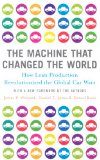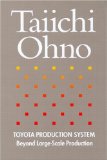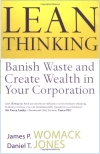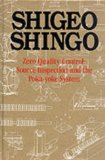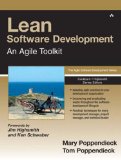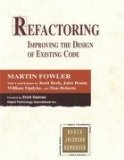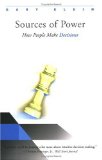Books that I talked about on "Building the Lean Web Development Team" 14/10/09
October 16 2009, 12:28 PM
This is a list of the books that I talked about on the "Beta" course I ran in Bristol on 14/10/09. I'm writing this list out so that I can send it to the attendees, but I also thought it would be good to share it here.
This is the book that started off my investigations into Lean and it's well worth a read, even though, I think Womack and Jones, who've gone on to write several further books, have changed their thinking a lot since they wrote this.The thing I particularly like about it is the unimpressed view of western manufacturing from a Japanese perspective.
The grandaddy. The dude.I'm wary of treating any book as a hallowed text, but there's a lot of interesting stuff in this one. Even more interesting than the specific content is the approach. It take vision to look at the huge success of Ford's mass production system and say "Naw, we're not going to do that, we're going to do something different."One way of thinking about Lean approaches is that they are a process of "Learning to See", another is that progress comes through continually looking at what you are doing and asking "What is it? What is it?". I think Taiichi Ohno might have been one of the few people ever who really understood what a car factory was.
This is a later book from Womack and Jones with detailed case studies of several companies that have adopted Lean methods in order to improve their performance, including Porsche.
Again, the main benefit of the thinking in this book is its difference in approach. This time to catching and fixing mistakes, not by yelling at staff to be better, but by working to improve the system.
I haven't yet read this all the way through, but it looks very good. The only issue that I have with it is that it's software oriented, and part of the point of the course yesterday was to question whether web development is actually software-oriented, or actually something entirely, or considerably different.
A good book to look at when you're trying to think of Poka Yoke methods to mistake-proof your operations.
Used this as a source for a value-generation exercise that we did: got people to tell stories about their expertise.
For further information, contact mark.stringer@gmail.com (07736 807 604)
The Machine That Changed The World
This is the book that started off my investigations into Lean and it's well worth a read, even though, I think Womack and Jones, who've gone on to write several further books, have changed their thinking a lot since they wrote this.The thing I particularly like about it is the unimpressed view of western manufacturing from a Japanese perspective.
Taiichi Ohno, the Toyota Production System
The grandaddy. The dude.I'm wary of treating any book as a hallowed text, but there's a lot of interesting stuff in this one. Even more interesting than the specific content is the approach. It take vision to look at the huge success of Ford's mass production system and say "Naw, we're not going to do that, we're going to do something different."One way of thinking about Lean approaches is that they are a process of "Learning to See", another is that progress comes through continually looking at what you are doing and asking "What is it? What is it?". I think Taiichi Ohno might have been one of the few people ever who really understood what a car factory was.
Lean Thinking: Banish Waste and Create Wealth in Your Corporation
This is a later book from Womack and Jones with detailed case studies of several companies that have adopted Lean methods in order to improve their performance, including Porsche.
Zero Quality Control: Source Inspection and the Poka-Yoke System
Again, the main benefit of the thinking in this book is its difference in approach. This time to catching and fixing mistakes, not by yelling at staff to be better, but by working to improve the system.
Mary and Tom Poppendieck: Lean Software Development, an Agile Toolkit
I haven't yet read this all the way through, but it looks very good. The only issue that I have with it is that it's software oriented, and part of the point of the course yesterday was to question whether web development is actually software-oriented, or actually something entirely, or considerably different.
Martin Fowler: Re-factoring - Improving the Design of Existing Code.
A good book to look at when you're trying to think of Poka Yoke methods to mistake-proof your operations.
Used this as a source for a value-generation exercise that we did: got people to tell stories about their expertise.
For further information, contact mark.stringer@gmail.com (07736 807 604)
